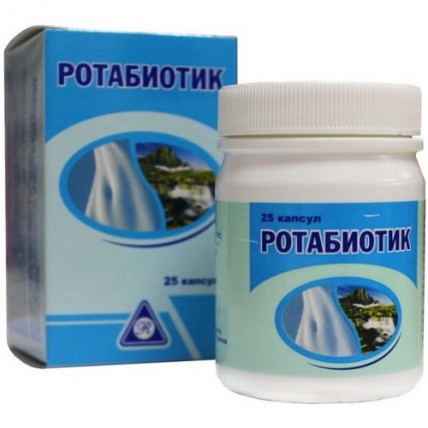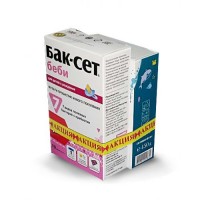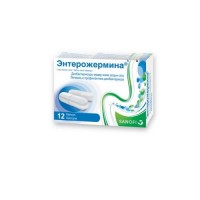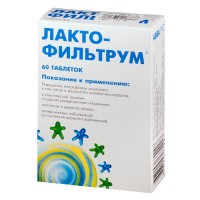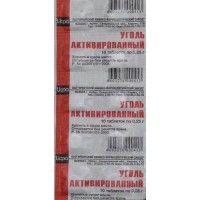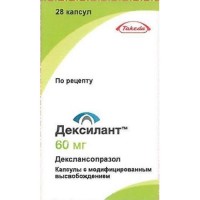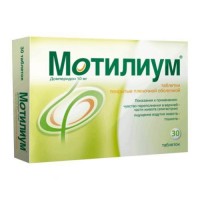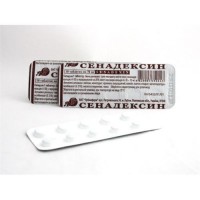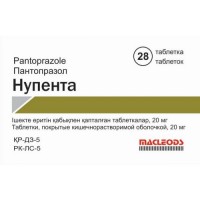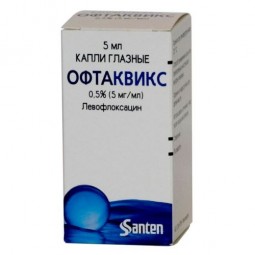RotabiotikRotabiotik-it is drug which restores normal flora of intestines.
Rotabiotik incorporates - beneficial bacteria, such as:
The lyophilized bacteria 2.5 x 109, WHICH:
- Lactobaccillusbulgaricus 0.5 x 109, WHICH
- Streptococcus thermophilus 0.8kh 109 WHICH
- Lactobaccillus acidophilus 0.8kh 109 WHICH
- Bifidobacterium ssp. (Bifidobacteriumbifidum, Bifidobacteriumlongum, Bifidobacteriuminfantis) 0.4kh 109 WHICH
And INULIN Prebiotic is food ingredients which are not digested enzymes of the person and are not acquired in upper parts of digestive tract, stimulate growth and activity of useful microflora.
Rotabiotik is a probiotic - according to definition of WHO, a probiotics:
The bacteria, apatogenous for the person, having antagonistic activity concerning pathogenic and conditionally pathogenic bacteriums and providing restoration of normal microflora.
Modern representation of the mechanism of positive action of probiotics is their versatility associated with suppression of pathogenic and uslovnopatogenny microorganisms at the expense of products of biologically active agents, the competition for nutrients and adhesions on an intestinal wall, influence on enzymatic activity of digestive tract and stimulations of the immune system of an organism of the owner.
The most important property of pro-biotic bacteria is ensuring kolonizatsionny resistance, i.e. ability of protection of an intestinal wall against penetration into internal environment of an organism both bacteria, and toxins and toxic products of various origin.
Antagonistic action of pro-biotic bacteria is connected also with products of organic acids, bacteriocines and inhibitory proteins, including, thermolabile and thermostable is high - and low-molecular antibacterial substances. Organic acids are the final products of metabolism which are excreted to the environment.
It is milk, acetic, oil, propionic, isobutyric, isovalerianic, ant, suktsinilovy, amber, etc. acids.
The antimicrobic effect of milk and acetic acids is well studied. Bifidoflor on physiological functions of an organism of children and adults connect positive influence with products it the milk and acetic acids creating acid reaction which interferes with reproduction of pathogenic, putrefactive and gas-forming microflora in intestines.
Carry peroxide of hydrogen and diacetyl to low-molecular antibacterial substances. Both of these substances have antimicrobic activity in relation to a wide range of pathogenic and uslovnopatogenny microorganisms.
Normal microflora is also capable to inactivate the potential toxic products, including carcinogens, various on the chemical composition, getting from the outside or formed in an organism. Normal intestinal microflora is metabolic body which is involved in transformation of natural and alien substances. The detoksikatsionny effect of the anaerobic normoflora producing nitroreductase concerning 1 nitropyrene and its metabolites which are powerful carcinogens is established.
These literatures testify to a huge role of normal intestinal microflora as factor of nonspecific resistance which is implemented not only due to microbic antagonism, but also nonspecific activation of phagocytal and cytostatic activity of macrophages, stimulation of adenoid tissue, impact on immunocompetent T - and V-cells.
Prebiotics it is food ingredients which are not digested enzymes of the person and are not acquired in upper parts of digestive tract, stimulate growth and activity of useful microflora.
The main property of prebiotics is their selective stimulation useful to a human body of intestinal microflora to which first of all bifidobacteria and lactobacilli belong.
Prebiotics are in dairy products, corn flakes, grain, bread, onion, chicory field, garlic, haricot, peas, an artichoke, an asparagus, bananas, fruits of a baobab and many other products.
Simbiotiki is a combination pre- and probiotics.
Beneficial bacteria of our intestines perish in the following cases:
1. If environment in which they live becomes too acidic or too alkaline, it damages a metabolism and cellular membranes of useful microbes (cholecystitis, pancreatitis, hepatitis, gastritis, a peptic ulcer, intestines diseases),
2. If digestive enzymes are emitted insufficiently, and the undigested remains of food are exposed to fermentation and serve as substrate for growth
of pathogenic microbes (disturbance of functions of a stomach, pancreas, liver),
3. If muscles of intestines do not provide the correct advance of contents on intestines (decrease in a tone or spasms of unstriated muscles intestines/dyskinesia / because of a mental or physical stress, vegeto-vascular dystonia, the undergone surgeries on a stomach and intestines,
4. If in a diet there are not enough substances serving as substrate for growth of useful microbes or there are substances promoting their death. These are the rigid (refined) diets, dry food. The lack of a diet of the person of fermented milk products and cellulose deprives useful flora of nutrient medium. The prevalence in food meat, flour, sharp, fat, plain carbohydrates, starch, yeast, preservatives - kills normal flora.
5. If at intestines there are parasites (worms, protozoa) or pathogenic microbes, they emit the substances killing useful microbes (dysentery, salmonellosis, viral diseases, a giardiasis, helminthoses),
6. Uncontrolled reception of antibiotics: they kill not only bad microbes against which are designed to fight, but also good (an antibiotic - the associated intestinal dysbiosis).
7. Decrease in protective forces of an organism. Hormonal and immune disturbances, chronic stress.
8. Use of tsitostatik, glucocorticoids, organism snizhayushchikhimmunorezistentnost.
9. The modern medicines reducing gastric secretion (blockers of the proton pump or blockers of H2-histamine receptors) also capable, though indirectly to reduce resistance of natural intestinal microflora.
10. Excessive alcohol intake,
11. Frequent respiratory diseases.
Normal digestion within two months, as a rule, allows to restore infectious diseases of a respiratory system, Treatment. The diet during treatment has to contain a minimum of carbohydrate food. In treatment of an intestinal dysbiosis now key position is held by a probiotics the drugs containing microorganisms which have positive impact on kishechnyymikrobiotsenoz.
Treatment of dysbacteriosis is carried out in several directions.
First, also exact diagnosis and elimination of the prime cause of a disease, whether it be excessive reception of antibiotics, poisoning or an infectious disease is necessary.
After elimination of the reason the treatment is carried out by the drugs containing those bacteria which are not enough (it is considered that in case of successful treatment these bacteria take root and breed to necessary level). The enzymes of chemical changes of digestion substituting drugs which are normal fermented by microflora and also the drugs suppressing development of competitors of useful microflora (microscopic mushrooms) are at the same time used.
In addition for elimination of symptoms of malabsorption and dyspepsia of disturbances of digestion use the drugs substituting gastric and (or) intestinal digestive enzymes.
Sometimes along with antibacterial therapy by antibiotics (especially penicillin) or streptocides appoint anti-fungal antibiotics (for example, Nistatin) for the purpose of prevention of dysbacteriosis and also treatment of skin dysbacteriosis, especially at long antibacterial therapy.
As a rule, along with pre- and a probiotics fermental drugs, sorbents (white coal, activated carbon, the smekt, Polyphepanum, etc.) and other drugs as dysbacteriosis not a disease, but only a part of other diseases are appointed, respectively, the detoxication of an organism and treatment of a basic disease is necessary.
Information on
Indication drug ROTABIOTIK
Restoration and normalization of intestinal microflora
Infectious diarrhea, a gastroenteritis, a coloenteritis
Prevention and treatment an antibiotic - the associated diarrhea
Constipations
the Syndrome of the angry intestines, Crohn's disease
Tranzitorny dysfunctions of intestines at change of a diet, dyspepsia
Decrease in immunity and frequent catarrhal diseases
Allergic diseases, atopic dermatitis
the Bacterial vaginosis
of Eradikation of H. Pylori, t.e prevention of a peptic ulcer of a stomach and the 12th perstny gut.
Diarrhea at beam both chemotherapy
the Route of administration and doses
Rotabiotik accept inside, after a meal, washing down with a small amount of liquid.
To children up to 3 years is also more senior which cannot swallow the whole capsule, it needs to be opened, to pour out contents in a spoon and to mix with a small amount of liquid.
Children from 1 year to 3 years: on 1 capsule 2 times a day,
Children from 3 to 12 years: on 1 capsule 3 times a day.
Adults and teenagers are more senior than 12 years: on 1-2 capsules 3 times a day.
Duration of reception depends on the reason of development of dysbacteriosis and specific features of an organism, on average 10 days.
A form of release and packing
of 25 capsules in a bottle.
1 bottle in a cardboard box together with the instruction for use in the state and Russian languages.
The producer
the Owner of a trademark and the certificate of registration is the Rotafarm company, Great Britain
Is made KendiFarm, the street Sofia 101, 1320 Bankya, Bulgaria.
To develop
Rotabiotik incorporates - beneficial bacteria, such as:
The lyophilized bacteria 2.5 x 109, WHICH:
- Lactobaccillusbulgaricus 0.5 x 109, WHICH
- Streptococcus thermophilus 0.8kh 109 WHICH
- Lactobaccillus acidophilus 0.8kh 109 WHICH
- Bifidobacterium ssp. (Bifidobacteriumbifidum, Bifidobacteriumlongum, Bifidobacteriuminfantis) 0.4kh 109 WHICH
And INULIN Prebiotic is food ingredients which are not digested enzymes of the person and are not acquired in upper parts of digestive tract, stimulate growth and activity of useful microflora.
Rotabiotik is a probiotic - according to definition of WHO, a probiotics:
The bacteria, apatogenous for the person, having antagonistic activity concerning pathogenic and conditionally pathogenic bacteriums and providing restoration of normal microflora.
Modern representation of the mechanism of positive action of probiotics is their versatility associated with suppression of pathogenic and uslovnopatogenny microorganisms at the expense of products of biologically active agents, the competition for nutrients and adhesions on an intestinal wall, influence on enzymatic activity of digestive tract and stimulations of the immune system of an organism of the owner.
The most important property of pro-biotic bacteria is ensuring kolonizatsionny resistance, i.e. ability of protection of an intestinal wall against penetration into internal environment of an organism both bacteria, and toxins and toxic products of various origin.
Antagonistic action of pro-biotic bacteria is connected also with products of organic acids, bacteriocines and inhibitory proteins, including, thermolabile and thermostable is high - and low-molecular antibacterial substances. Organic acids are the final products of metabolism which are excreted to the environment.
It is milk, acetic, oil, propionic, isobutyric, isovalerianic, ant, suktsinilovy, amber, etc. acids.
The antimicrobic effect of milk and acetic acids is well studied. Bifidoflor on physiological functions of an organism of children and adults connect positive influence with products it the milk and acetic acids creating acid reaction which interferes with reproduction of pathogenic, putrefactive and gas-forming microflora in intestines.
Carry peroxide of hydrogen and diacetyl to low-molecular antibacterial substances. Both of these substances have antimicrobic activity in relation to a wide range of pathogenic and uslovnopatogenny microorganisms.
Normal microflora is also capable to inactivate the potential toxic products, including carcinogens, various on the chemical composition, getting from the outside or formed in an organism. Normal intestinal microflora is metabolic body which is involved in transformation of natural and alien substances. The detoksikatsionny effect of the anaerobic normoflora producing nitroreductase concerning 1 nitropyrene and its metabolites which are powerful carcinogens is established.
These literatures testify to a huge role of normal intestinal microflora as factor of nonspecific resistance which is implemented not only due to microbic antagonism, but also nonspecific activation of phagocytal and cytostatic activity of macrophages, stimulation of adenoid tissue, impact on immunocompetent T - and V-cells.
Prebiotics it is food ingredients which are not digested enzymes of the person and are not acquired in upper parts of digestive tract, stimulate growth and activity of useful microflora.
The main property of prebiotics is their selective stimulation useful to a human body of intestinal microflora to which first of all bifidobacteria and lactobacilli belong.
Prebiotics are in dairy products, corn flakes, grain, bread, onion, chicory field, garlic, haricot, peas, an artichoke, an asparagus, bananas, fruits of a baobab and many other products.
Simbiotiki is a combination pre- and probiotics.
Beneficial bacteria of our intestines perish in the following cases:
1. If environment in which they live becomes too acidic or too alkaline, it damages a metabolism and cellular membranes of useful microbes (cholecystitis, pancreatitis, hepatitis, gastritis, a peptic ulcer, intestines diseases),
2. If digestive enzymes are emitted insufficiently, and the undigested remains of food are exposed to fermentation and serve as substrate for growth
of pathogenic microbes (disturbance of functions of a stomach, pancreas, liver),
3. If muscles of intestines do not provide the correct advance of contents on intestines (decrease in a tone or spasms of unstriated muscles intestines/dyskinesia / because of a mental or physical stress, vegeto-vascular dystonia, the undergone surgeries on a stomach and intestines,
4. If in a diet there are not enough substances serving as substrate for growth of useful microbes or there are substances promoting their death. These are the rigid (refined) diets, dry food. The lack of a diet of the person of fermented milk products and cellulose deprives useful flora of nutrient medium. The prevalence in food meat, flour, sharp, fat, plain carbohydrates, starch, yeast, preservatives - kills normal flora.
5. If at intestines there are parasites (worms, protozoa) or pathogenic microbes, they emit the substances killing useful microbes (dysentery, salmonellosis, viral diseases, a giardiasis, helminthoses),
6. Uncontrolled reception of antibiotics: they kill not only bad microbes against which are designed to fight, but also good (an antibiotic - the associated intestinal dysbiosis).
7. Decrease in protective forces of an organism. Hormonal and immune disturbances, chronic stress.
8. Use of tsitostatik, glucocorticoids, organism snizhayushchikhimmunorezistentnost.
9. The modern medicines reducing gastric secretion (blockers of the proton pump or blockers of H2-histamine receptors) also capable, though indirectly to reduce resistance of natural intestinal microflora.
10. Excessive alcohol intake,
11. Frequent respiratory diseases.
Normal digestion within two months, as a rule, allows to restore infectious diseases of a respiratory system, Treatment. The diet during treatment has to contain a minimum of carbohydrate food. In treatment of an intestinal dysbiosis now key position is held by a probiotics the drugs containing microorganisms which have positive impact on kishechnyymikrobiotsenoz.
Treatment of dysbacteriosis is carried out in several directions.
First, also exact diagnosis and elimination of the prime cause of a disease, whether it be excessive reception of antibiotics, poisoning or an infectious disease is necessary.
After elimination of the reason the treatment is carried out by the drugs containing those bacteria which are not enough (it is considered that in case of successful treatment these bacteria take root and breed to necessary level). The enzymes of chemical changes of digestion substituting drugs which are normal fermented by microflora and also the drugs suppressing development of competitors of useful microflora (microscopic mushrooms) are at the same time used.
In addition for elimination of symptoms of malabsorption and dyspepsia of disturbances of digestion use the drugs substituting gastric and (or) intestinal digestive enzymes.
Sometimes along with antibacterial therapy by antibiotics (especially penicillin) or streptocides appoint anti-fungal antibiotics (for example, Nistatin) for the purpose of prevention of dysbacteriosis and also treatment of skin dysbacteriosis, especially at long antibacterial therapy.
As a rule, along with pre- and a probiotics fermental drugs, sorbents (white coal, activated carbon, the smekt, Polyphepanum, etc.) and other drugs as dysbacteriosis not a disease, but only a part of other diseases are appointed, respectively, the detoxication of an organism and treatment of a basic disease is necessary.
Information on
Indication drug ROTABIOTIK
Restoration and normalization of intestinal microflora
Infectious diarrhea, a gastroenteritis, a coloenteritis
Prevention and treatment an antibiotic - the associated diarrhea
Constipations
the Syndrome of the angry intestines, Crohn's disease
Tranzitorny dysfunctions of intestines at change of a diet, dyspepsia
Decrease in immunity and frequent catarrhal diseases
Allergic diseases, atopic dermatitis
the Bacterial vaginosis
of Eradikation of H. Pylori, t.e prevention of a peptic ulcer of a stomach and the 12th perstny gut.
Diarrhea at beam both chemotherapy
the Route of administration and doses
Rotabiotik accept inside, after a meal, washing down with a small amount of liquid.
To children up to 3 years is also more senior which cannot swallow the whole capsule, it needs to be opened, to pour out contents in a spoon and to mix with a small amount of liquid.
Children from 1 year to 3 years: on 1 capsule 2 times a day,
Children from 3 to 12 years: on 1 capsule 3 times a day.
Adults and teenagers are more senior than 12 years: on 1-2 capsules 3 times a day.
Duration of reception depends on the reason of development of dysbacteriosis and specific features of an organism, on average 10 days.
A form of release and packing
of 25 capsules in a bottle.
1 bottle in a cardboard box together with the instruction for use in the state and Russian languages.
The producer
the Owner of a trademark and the certificate of registration is the Rotafarm company, Great Britain
Is made KendiFarm, the street Sofia 101, 1320 Bankya, Bulgaria.
To develop
